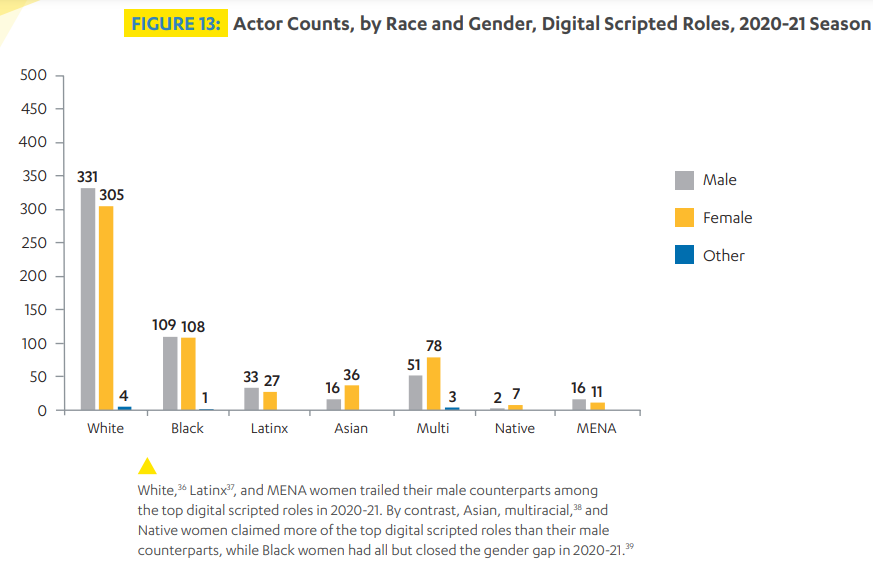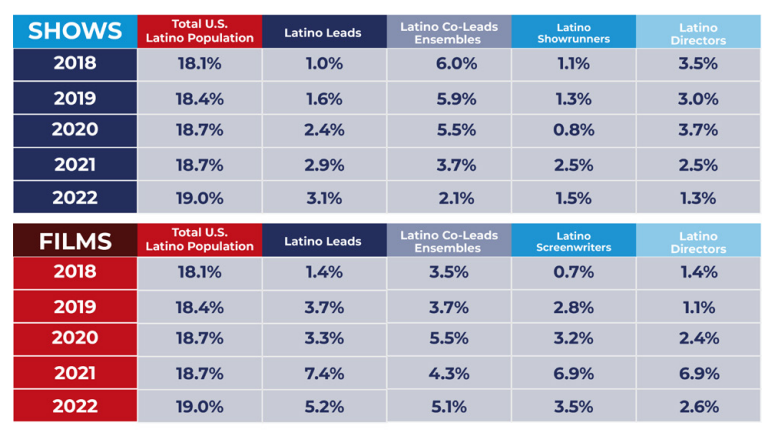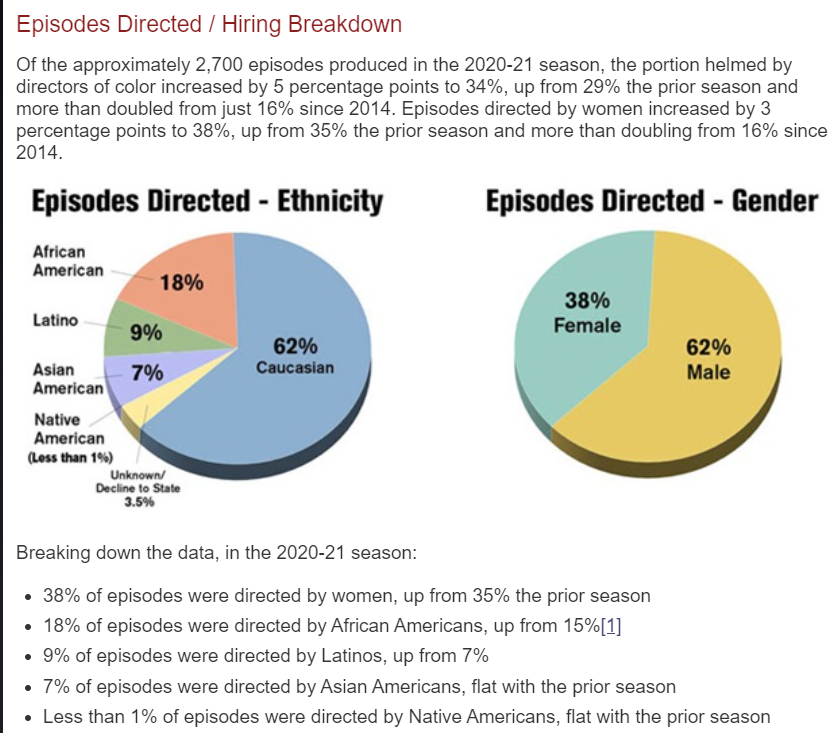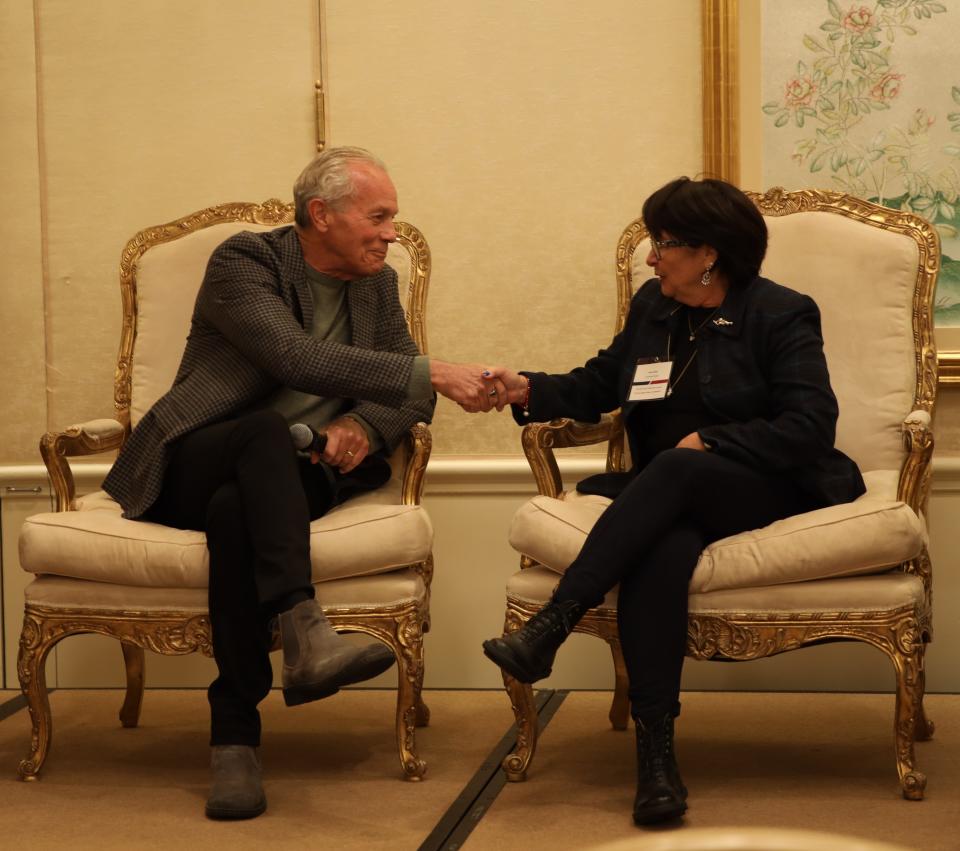Latino Advocacy Groups Vow to ‘Get Loud’ in 2023 About Lack of Progress in TV and Film Representation

It’s time to get loud. That is the 2023 plan for a number of Latino advocacy organizations that are working to turn up the pressure on Hollywood to achieve significant gains for Latinos at all levels of the entertainment industry.
The nonprofit Latino Donor Collaborative is finalizing plans for a two-day event in New York, May 2-3, targeting top-tier advertisers and leaders of consumer product companies. The goal is to deliver a series of upfront-like presentations that makes the strong business case for why reaching Latino consumers in the U.S. is imperative for the future growth across all sectors of the economy.
More from Variety
John Leguizamo Joins Taron Egerton in Apple Drama Series 'Firebug,' Kari Skogland to Direct
How Netflix's Massive Paydays, COVID and TikTok Caused 'Explosion of Comedians'
“We don’t have to get mad – we have to show them how much money they’re leaving on the table,” said Sol Trujillo, chairman of LDC and the former CEO of telecom firms US West, Orange and Telstra. “We need to bring on the data.”
The National Hispanic Media Coalition is working on a media guide that aims to educate business and civic leaders on the specifics of the Latino population and to attack stereotypes that persist. The NHMC, a nonprofit based in Los Angeles and Washington, D.C., is also focused on using its clout at a time of consolidation in media and entertainment to challenge merger and acquisition deals with federal regulators for companies that have a weak track record with Latinos. NHMC was among the advocacy groups that was critical of Penguin Random House’s proposed $2.1 billion takeover of publisher Simon & Schuster, which was blocked by a federal judge last month after an antitrust trial.
“There’s not just one answer to this problem,” said Brenda Castillo, president and CEO of NHMC. “We need to get to the deep root of the problem, which is at the executive and board level. The [Justice Department] needs to stop approving mergers for companies that already have a problem with diversity and inclusion, especially as it involves Latinos.”
The LDC and NHMC are are not formally connected but rather part of a groundswell of activity driven by frustration at the lack of progress for Latinos in Hollywood, despite the awakening around racial inequities spurred by the pandemic and the murder of George Floyd in 2020.

The quantity of Latino representation as lead actors, writers and directors in TV and film has not budged from the 1.5% to 3% range in the past five years, according to research commissioned by the LDC. Given that the U.S. Latino population at present stands at 19% and is projected to grow to more than 30% over the next 20 years, advocates are vowing to make CEOs and other decision-makers accountable for their showing on Latinos specifically rather than broader diversity, equity and inclusion metrics.
The urgency to bring Latino characters and themes more holistically into mainstream content is underscored by data from the LDC and a separate recent study by Nielsen. Latinos tend to watch more content that incorporates Latino themes. And shows with prominent Latino leads or co-leads tended to be stickier and generate more binge-watching, per Nielsen.
“The business premise of this equation should be known by every content creator in Hollywood,” said Ana Valdez, president and CEO of LDC. “They should be talking about it in their pitches.”
Multihyphenate John Leguizamo called the situation “cultural apartheid” during a presentation he gave at the Nov. 30 gathering of Latino leaders in entertainment held in Beverly Hills by the LDC. The organization’s 20th such convening since its founding in 2010 was preparation for the big push with advertisers in May. Leguizamo, who has been outspoken on Latino representation issues, gave a rundown of the power of Latino consumer dollars in entertainment that was titled “Latino Data for Morons,” a variation on his acclaimed one-man stage show “Latin History for Morons,” which also became a Netflix special.
In 2019, per LDC data, Latinos accounted for about 29% of all U.S. box office tickets and the population spent about $4 billion on streaming services – a number that has surely only grown in recent years amid the streaming boom. Latinos already make up about 25% of the 18-34 adult demographic, which makes them “economic speed racers,” with average income that grew at a faster rate from 2010 to 2020 than non-Hispanic whites, Leguizamo noted.

There is a disconnect between the economic reality and the fact that Latino directors accounted for 1.4% of directors of the top 100 grossing films in 2018. That number rose to 6.9% amid the upheaval of 2021, but is tracking at 2.6% through the end of August for 2022. The number of Latino leads in movies is growing – from 1.4% in 2018 to 5.2% for 2022 through August, but that’s still not remotely close to parity.
“Hollywood is making content for an audience that won’t exist in the future,” he said. “They’re building an eight-cylinder engine for a battery-powered Latino future.”
Leguizamo pointed to the recent outcry over the casting of non-Latino actor James Franco in the role of Fidel Castro for an upcoming biopic. “If everything was equal – sure,” Leguizamo said during a Q&A session with Trujillo. But until Latinos don’t have to fight so hard for a foot in the door, those kind of casting decisions are going to generate protest, he said.
During the half-day LDC event, Trujillo and others mentioned burgeoning efforts to raise private investment funds to support Latino-owned media ventures. Leguizamo and others cited Tyler Perry’s success in working outside traditional Hollywood by building a thriving studio facility in Atlanta that gives him much more say and sway when partnering with Big Media.

“That’s what we need to be doing and manifesting,” Leguizamo told Trujillo, who is one of the most prominent Latino business leaders and a former board member of Target and ad giant WPP.
Producer Monica Gil-Rodriguez, co-founder and CEO of Los Angeles-based CRE84U Entertainment, hopes to do just that with a soundstage venture that her company is working to build in Mexico City to take advantage of tax incentives and cost efficiencies. The need for Latino creatives to have greater control over their production is important because of the historically high hurdles of getting a greenlight at a major shop.
“Even when (Latino-produced) shows are sold, the budgets may be significantly reduced compared to non-Latino productions,” Gil-Rodriguez said. “This can often feel like a form of discrimination and reflects the ongoing issue of unequal pay and treatment for Latino creators and actors in the entertainment industry. The marketing of Latino-focused TV shows is also often limited and inadequate, further hindering their success and visibility.”
Writer and actor Luisa Leschen didn’t mince words during the LDC gathering about the ups and downs of pitching projects at a time when the industry is ostensibly looking to open doors to new and underrepresented talent.

“There’s no infrastructure for this,” she said. “You’re not pitching your project to anybody who understands the culture. You’re pitching to Emily who is 28 and from Connecticut.”
For industry veterans, the need for a more coordinated effort among the diverse communities within the U.S. Latino diaspora is obvious. “Avatar” and “Avatar: The Way of Water” producer David Valdes, also a longtime partner in film production with Clint Eastwood, said flatly during the LDC gathering that he has been here before. He cited an effort in the mid-1990s at the DGA that inspired him to develop a host of Latino-themed movie projects – and not one of them got sold to a major studio.
“We don’t bang the drum,” Valdes said of Latino advocacy in the past.
At the same time, the environment today is changing because of Hollywood’s obsession with metrics, and because TV and film content has so many more distribution opportunities than even a decade ago. Among his upcoming movie projects is a period drama set against the backdrop of the early 1960s music scene in San Antonio, Texas. It is by definition a Latino-themed story, but Valdes does not see it as a Latino movie per se.
“I’m making it for a universal audience,” he said.
NHMC’s Castillo emphasized that part of her organization’s mission is to rally Latino consumers around projects that reflect mainstream Latino inclusion. She cited “Lopez vs. Lopez,” the new NBC comedy series starring George Lopez and his daughter, Mayan Lopez.
“We will show up,” she said. “Part of our work is empowering our community that they have the power to make or break a film. We can unite when there’s a film that stereotypes us. All you have to do is not buy a ticket. Don’t buy the T-shirts.”
By the LDC’s calculation, the economic output of the nearly 63 million Latinos in the U.S. amounts to $2.8 trillion, which is on par with France and Italy. The LDC’s goal with its New York presentation in May is not to threaten boycotts or ramp up social justice activism but to hammer home to Madison Avenue the economic imperative of embracing the needs of Latino consumers in more significant way.
“We win where there are metrics,” Trujillo said. “We lose when (decisions) are about an executive’s tastes.”
Jeff Valdez, a multihyphenate who is creator and showrunner of the HBO Max comedy “The Garcias” (who is married to LDC’s Ana Valdez) issued a call for industry Latinos to work harder to harness their collective voice.
“We need to invest in our own. It’s time for everyone to go buy shares in every big media company so we can go to their meetings and have a say,” Valdez said. “We are not about ‘Viva La Raza, let’s burn the building down.’ We need to make them see that it’s just good business.”
(Pictured top: John Leguizamo presents “Latino Data for Morons” at the Nov. 30 Latino Donor Collaborative gathering in Beverly Hills.)
Best of Variety
Sign up for Variety’s Newsletter. For the latest news, follow us on Facebook, Twitter, and Instagram.

